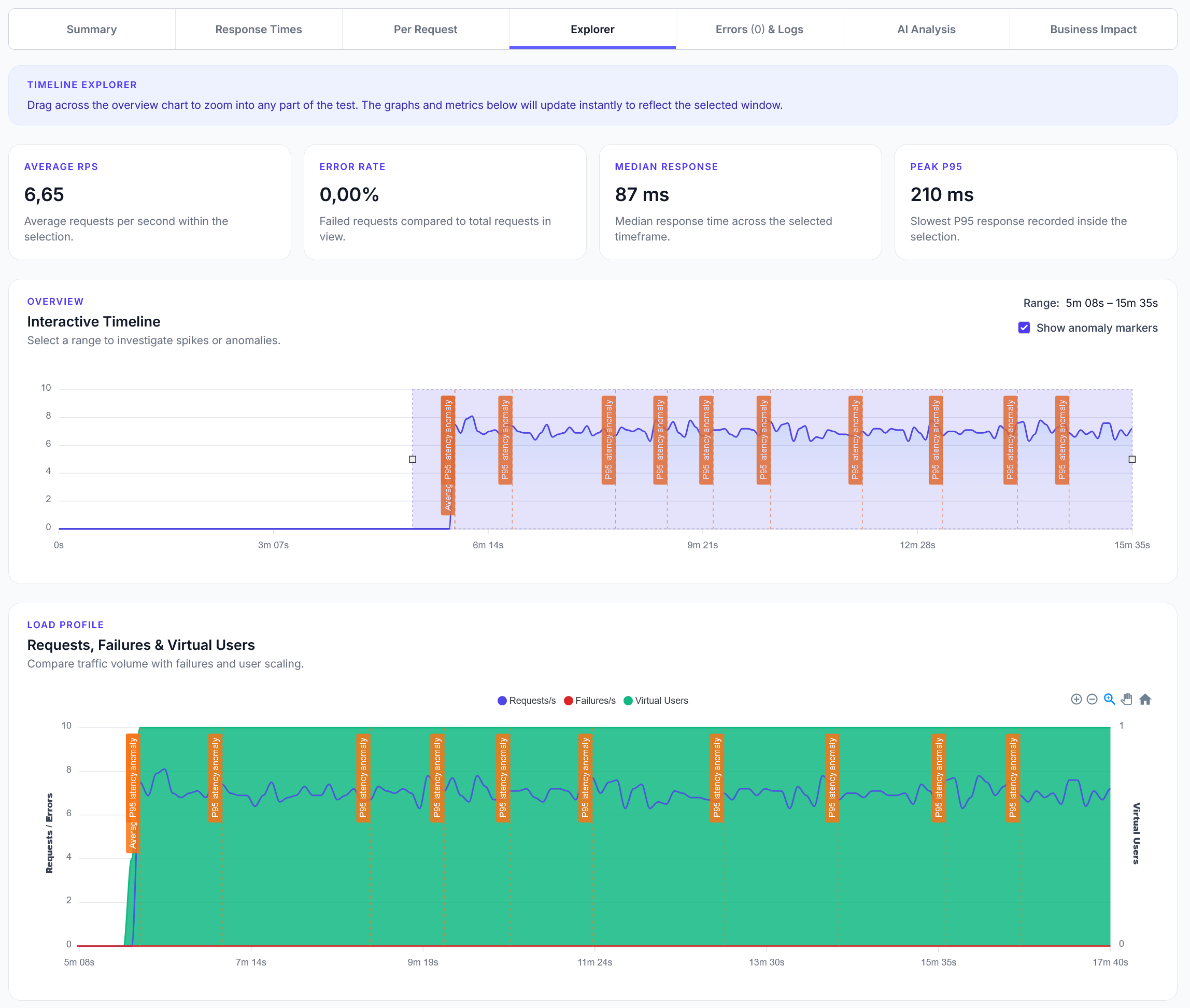
Explorer reports addition
We have added a new Explorer feature to reports, with a timeline scrubber and easy anomaly detection.
Basic file upload API testing for single files, multiple files, and large file handling
LoadForge can record your browser, graphically build tests, scan your site with a wizard and more. Sign up now to run your first test.
This guide shows how to test file upload APIs with different file types, sizes, and upload scenarios.
from locust import task, HttpUser
import random
import io
class FileUploadTestUser(HttpUser):
def on_start(self):
# File upload endpoints
self.upload_endpoints = {
"single": "/api/upload/single",
"multiple": "/api/upload/multiple",
"large": "/api/upload/large",
"validate": "/api/upload/validate"
}
# File types for testing
self.file_types = {
"image": {"ext": "jpg", "mime": "image/jpeg"},
"document": {"ext": "pdf", "mime": "application/pdf"},
"text": {"ext": "txt", "mime": "text/plain"},
"video": {"ext": "mp4", "mime": "video/mp4"}
}
# File sizes (in bytes)
self.file_sizes = {
"small": 1024, # 1KB
"medium": 1024*100, # 100KB
"large": 1024*1024, # 1MB
"xlarge": 1024*1024*10 # 10MB
}
def create_test_file(self, file_type="text", size="small"):
"""Create a test file in memory"""
file_info = self.file_types[file_type]
file_size = self.file_sizes[size]
# Create file content
if file_type == "text":
content = b"A" * file_size
elif file_type == "image":
# Minimal JPEG header + data
content = b'\xff\xd8\xff\xe0\x00\x10JFIF' + b"X" * (file_size - 14)
else:
content = b"TESTFILE" + b"X" * (file_size - 8)
filename = f"test_file_{random.randint(1000, 9999)}.{file_info['ext']}"
return {
"content": content,
"filename": filename,
"mime_type": file_info["mime"]
}
@task(4)
def test_single_file_upload(self):
"""Test uploading a single file"""
file_type = random.choice(list(self.file_types.keys()))
file_size = random.choice(["small", "medium"])
test_file = self.create_test_file(file_type, file_size)
files = {
"file": (test_file["filename"], test_file["content"], test_file["mime_type"])
}
data = {
"description": f"Test {file_type} upload",
"category": file_type
}
with self.client.post(
self.upload_endpoints["single"],
files=files,
data=data,
name="Single File Upload"
) as response:
if response.status_code == 200:
try:
result = response.json()
file_id = result.get("file_id") or result.get("id")
uploaded_size = result.get("size", 0)
print(f"Single upload success: {test_file['filename']} ({uploaded_size} bytes)")
# Validate uploaded file size
if uploaded_size != len(test_file["content"]):
response.failure(f"Size mismatch: expected {len(test_file['content'])}, got {uploaded_size}")
except Exception as e:
response.failure(f"Invalid response: {str(e)}")
elif response.status_code == 413:
print("File too large (expected for large files)")
elif response.status_code == 415:
print("Unsupported file type (may be expected)")
else:
response.failure(f"Single file upload failed: {response.status_code}")
@task(3)
def test_multiple_file_upload(self):
"""Test uploading multiple files"""
num_files = random.randint(2, 4)
files = {}
data = {"batch_description": "Multiple file upload test"}
for i in range(num_files):
file_type = random.choice(list(self.file_types.keys()))
test_file = self.create_test_file(file_type, "small")
files[f"file_{i}"] = (test_file["filename"], test_file["content"], test_file["mime_type"])
with self.client.post(
self.upload_endpoints["multiple"],
files=files,
data=data,
name="Multiple File Upload"
) as response:
if response.status_code == 200:
try:
result = response.json()
uploaded_files = result.get("files", [])
print(f"Multiple upload success: {len(uploaded_files)} files")
# Validate number of uploaded files
if len(uploaded_files) != num_files:
response.failure(f"File count mismatch: expected {num_files}, got {len(uploaded_files)}")
except Exception as e:
response.failure(f"Invalid response: {str(e)}")
else:
response.failure(f"Multiple file upload failed: {response.status_code}")
@task(2)
def test_large_file_upload(self):
"""Test uploading large files"""
file_size = random.choice(["large", "xlarge"])
test_file = self.create_test_file("document", file_size)
files = {
"large_file": (test_file["filename"], test_file["content"], test_file["mime_type"])
}
data = {
"upload_type": "large_file",
"expected_size": len(test_file["content"])
}
with self.client.post(
self.upload_endpoints["large"],
files=files,
data=data,
name="Large File Upload",
timeout=60 # Longer timeout for large files
) as response:
if response.status_code == 200:
try:
result = response.json()
file_id = result.get("file_id")
print(f"Large file upload success: {test_file['filename']} ({file_size})")
except Exception as e:
response.failure(f"Invalid response: {str(e)}")
elif response.status_code == 413:
print(f"Large file rejected (size limit): {file_size}")
elif response.status_code == 408:
print(f"Large file upload timeout: {file_size}")
else:
response.failure(f"Large file upload failed: {response.status_code}")
@task(2)
def test_file_validation(self):
"""Test file upload validation and restrictions"""
# Test invalid file type
invalid_file = self.create_test_file("text", "small")
invalid_file["filename"] = "malicious.exe"
invalid_file["mime_type"] = "application/x-executable"
files = {
"file": (invalid_file["filename"], invalid_file["content"], invalid_file["mime_type"])
}
with self.client.post(
self.upload_endpoints["validate"],
files=files,
name="Invalid File Upload"
) as response:
if response.status_code == 415:
print("Invalid file type correctly rejected")
elif response.status_code == 400:
print("Invalid file correctly rejected (bad request)")
elif response.status_code == 200:
response.failure("Invalid file type was accepted")
else:
print(f"Invalid file upload returned: {response.status_code}")
@task(1)
def test_empty_file_upload(self):
"""Test uploading empty files"""
empty_file = {
"content": b"",
"filename": "empty.txt",
"mime_type": "text/plain"
}
files = {
"file": (empty_file["filename"], empty_file["content"], empty_file["mime_type"])
}
with self.client.post(
self.upload_endpoints["single"],
files=files,
name="Empty File Upload"
) as response:
if response.status_code == 400:
print("Empty file correctly rejected")
elif response.status_code == 200:
print("Empty file accepted (may be valid)")
else:
print(f"Empty file upload returned: {response.status_code}")
@task(1)
def test_file_upload_limits(self):
"""Test file upload size and count limits"""
# Try to upload many small files
max_files = 10
files = {}
for i in range(max_files):
test_file = self.create_test_file("text", "small")
files[f"file_{i}"] = (test_file["filename"], test_file["content"], test_file["mime_type"])
with self.client.post(
self.upload_endpoints["multiple"],
files=files,
name="Upload Limit Test"
) as response:
if response.status_code == 200:
print(f"Upload limit test: {max_files} files accepted")
elif response.status_code == 413:
print(f"Upload limit reached (expected): {max_files} files")
elif response.status_code == 400:
print(f"Upload limit validation: {max_files} files rejected")
else:
print(f"Upload limit test returned: {response.status_code}")